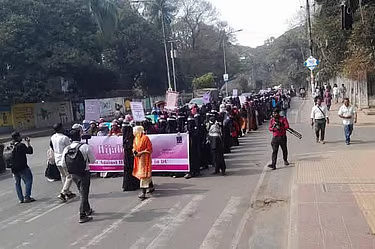The internet has not yet returned to normal in the country. Mobile internet services remain shut down by government order.
Suhada Afrin
The government often orders internet shutdowns to suppress protests and dissent, mainly affecting mobile internet. Recently, due to protests, clashes, shootings, and arson linked to the quota reform movement, the country experienced a complete internet shutdown for five days. The internet has still not returned to normal, with mobile internet services still suspended by government order.
This situation is more common in countries where democracy is not well-established. Without the internet, Bangladesh was effectively disconnected from the world. The government cited sabotage at a data center as the reason for the shutdown. However, experts say there is no connection between damage to the data center and the nationwide internet shutdown.
Several international organizations track how long countries shut down internet services. One such organization is the “Internet Society,” a U.S.-based nonprofit working on internet accessibility. According to their website, Bangladesh experienced a full internet shutdown for 5 days and 12 hours (July 18-23).
According to data from Cloudflare’s outage center, war-torn Syria tops the list for internet disruptions, with a government-ordered shutdown lasting several hours on July 25. Following Syria, Bangladesh is next, with Cloudflare noting an internet shutdown from midnight on July 17 by government order.
According to data from Cloudflare’s outage center, war-torn Syria tops the list for internet disruptions, with a government-ordered shutdown lasting several hours on July 25. Following Syria, Bangladesh is next, with Cloudflare noting an internet shutdown from midnight on July 17 by government order.
Amid the quota reform movement’s clashes, shootings, and arson, the government imposed a nationwide curfew from midnight on July 19. While relaxed at specific times, the curfew is still in effect. Before the curfew, mobile internet services were shut down at midnight on July 17, and broadband internet services were cut off at 8:45 PM on July 18. Broadband services resumed partially on the night of July 23. However, popular social media platforms like Facebook and TikTok remain blocked in Bangladesh, and WhatsApp and Instagram services are not yet back to normal.
Transparency International Bangladesh (TIB) called the government’s decision to shut down the internet to suppress protests or movements self-destructive. In a statement last Thursday, TIB Executive Director Iftekharuzzaman said it was evident that the main purpose of isolating the country from the world was to prevent free information and expression.
On July 18, a fire broke out in the Disaster Building in Mohakhali. Adjacent buildings house data centers for IIG (International Internet Gateway) and offices of some internet providers. Multiple internet service providers told Prothom Alo that some cables outside these buildings were damaged in the fire. To prevent the fire from spreading, some cables connected to the data centers were cut.
Sources say around 30% of the country’s internet supply comes from the affected area in Mohakhali. However, the data center’s shutdown there shouldn’t have led to a nationwide internet outage.
Sources say around 30% of the country’s internet supply comes from the affected area in Mohakhali. However, the data center’s shutdown there shouldn’t have led to a nationwide internet outage.
On July 18, at an event, the State Minister for Posts, Telecommunications and Information Technology, Zunaid Ahmed Palak, cited national and public security as the reason for the internet shutdown. Later, he said that the internet service was down due to the damage to the data center in Mohakhali.
New York-based Access Now, which works on digital rights, and the KeepItOn Coalition, which monitors internet shutdowns, published a report on the latest internet shutdowns in March. This report highlights the situation in 2023, stating that governments in various countries shut down internet services to suppress violence, war crimes, attacks on democracy, and other atrocities. In 2023, mobile internet services were shut down three times in Bangladesh, and six times in 2022.
The report states that internet services were shut down 63 times in 15 countries to suppress dissent. Bangladesh is included in this list, which also highlights countries with frequent service interruptions. The KeepItOn Coalition urged the Bangladesh government to restore internet services on July 19.
Md. Saimum Reza Talukder, a senior lecturer in the law department at BRAC University, told Prothom Alo that global research shows that governments in countries where democracy is not well-established or where the rule of law is significantly lacking tend to shut down the internet at their convenience. This allows the government to easily curtail people’s right to information and expression and to suppress the populace by isolating them from the internet.
countries where democracy is not well-established or where the rule of law is significantly lacking tend to shut down the internet at their convenience.









